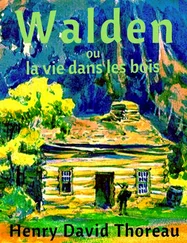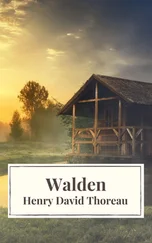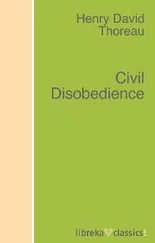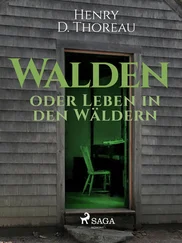The respectable folks,—
Where dwell they?
They whisper in the oaks,
And they sigh in the hay;
Summer and winter, night and day,
Out on the meadow, there dwell they.
They never die,
Nor snivel, nor cry,
Nor ask our pity
With a wet eye.
A sound estate they ever mend
To every asker readily lend;
To the ocean wealth,
To the meadow health,
To Time his length,
To the rocks strength,
To the stars light,
To the weary night,
To the busy day,
To the idle play;
And so their good cheer never ends,
For all are their debtors, and all their friends.
Concord River is remarkable for the gentleness of its current, which is scarcely perceptible, and some have referred to its influence the proverbial moderation of the inhabitants of Concord, as exhibited in the Revolution, and on later occasions. It has been proposed, that the town should adopt for its coat of arms a field verdant, with the Concord circling nine times round. I have read that a descent of an eighth of an inch in a mile is sufficient to produce a flow. Our river has, probably, very near the smallest allowance. The story is current, at any rate, though I believe that strict history will not bear it out, that the only bridge ever carried away on the main branch, within the limits of the town, was driven up stream by the wind. But wherever it makes a sudden bend it is shallower and swifter, and asserts its title to be called a river. Compared with the other tributaries of the Merrimack, it appears to have been properly named Musketaquid, or Meadow River, by the Indians. For the most part, it creeps through broad meadows, adorned with scattered oaks, where the cranberry is found in abundance, covering the ground like a moss-bed. A row of sunken dwarf willows borders the stream on one or both sides, while at a greater distance the meadow is skirted with maples, alders, and other fluviatile trees, overrun with the grape-vine, which bears fruit in its season, purple, red, white, and other grapes. Still farther from the stream, on the edge of the firm land, are seen the gray and white dwellings of the inhabitants. According to the valuation of 1831, there were in Concord two thousand one hundred and eleven acres, or about one seventh of the whole territory in meadow; this standing next in the list after pasturage and unimproved lands, and, judging from the returns of previous years, the meadow is not reclaimed so fast as the woods are cleared.
Let us here read what old Johnson says of these meadows in his "Wonder-working Providence," which gives the account of New England from 1628 to 1652, and see how matters looked to him. He says of the Twelfth Church of Christ gathered at Concord: "This town is seated upon a fair fresh river, whose rivulets are filled with fresh marsh, and her streams with fish, it being a branch of that large river of Merrimack. Allwifes and shad in their season come up to this town, but salmon and dace cannot come up, by reason of the rocky falls, which causeth their meadows to lie much covered with water, the which these people, together with their neighbor town, have several times essayed to cut through but cannot, yet it may be turned another way with an hundred pound charge as it appeared." As to their farming he says: "Having laid out their estate upon cattle at 5 to 20 pound a cow, when they came to winter them with inland hay, and feed upon such wild fother as was never cut before, they could not hold out the winter, but, ordinarily the first or second year after their coming up to a new plantation, many of their cattle died." And this from the same author "Of the Planting of the 19th Church in the Mattachusets' Government, called Sudbury": "This year (does he mean 1654) the town and church of Christ at Sudbury began to have the first foundation stones laid, taking up her station in the inland country, as her elder sister Concord had formerly done, lying further up the same river, being furnished with great plenty of fresh marsh, but, it lying very low is much indamaged with land floods, insomuch that when the summer proves wet they lose part of their hay; yet are they so sufficiently provided that they take in cattle of other towns to winter."
The sluggish artery of the Concord meadows steals thus unobserved through the town, without a murmur or a pulse-beat, its general course from southwest to northeast, and its length about fifty miles; a huge volume of matter, ceaselessly rolling through the plains and valleys of the substantial earth with the moccasoned tread of an Indian warrior, making haste from the high places of the earth to its ancient reservoir. The murmurs of many a famous river on the other side of the globe reach even to us here, as to more distant dwellers on its banks; many a poet's stream floating the helms and shields of heroes on its bosom. The Xanthus or Scamander is not a mere dry channel and bed of a mountain torrent, but fed by the everflowing springs of fame;—
"And thou Simois, that as an arrowe, clere
Through Troy rennest, aie downward to the sea";—
and I trust that I may be allowed to associate our muddy but much abused Concord River with the most famous in history.
"Sure there are poets which did never dream
Upon Parnassus, nor did taste the stream
Of Helicon; we therefore may suppose
Those made not poets, but the poets those."
The Mississippi, the Ganges, and the Nile, those journeying atoms from the Rocky Mountains, the Himmaleh, and Mountains of the Moon, have a kind of personal importance in the annals of the world. The heavens are not yet drained over their sources, but the Mountains of the Moon still send their annual tribute to the Pasha without fail, as they did to the Pharaohs, though he must collect the rest of his revenue at the point of the sword. Rivers must have been the guides which conducted the footsteps of the first travellers. They are the constant lure, when they flow by our doors, to distant enterprise and adventure, and, by a natural impulse, the dwellers on their banks will at length accompany their currents to the lowlands of the globe, or explore at their invitation the interior of continents. They are the natural highways of all nations, not only levelling the ground and removing obstacles from the path of the traveller, quenching his thirst and bearing him on their bosoms, but conducting him through the most interesting scenery, the most populous portions of the globe, and where the animal and vegetable kingdoms attain their greatest perfection.
I had often stood on the banks of the Concord, watching the lapse of the current, an emblem of all progress, following the same law with the system, with time, and all that is made; the weeds at the bottom gently bending down the stream, shaken by the watery wind, still planted where their seeds had sunk, but erelong to die and go down likewise; the shining pebbles, not yet anxious to better their condition, the chips and weeds, and occasional logs and stems of trees that floated past, fulfilling their fate, were objects of singular interest to me, and at last I resolved to launch myself on its bosom and float whither it would bear me.
Table of Contents
"Come, come, my lovely fair, and let us try
Those rural delicacies."
Christ's Invitation to the Soul. — Quarles
At length, on Saturday, the last day of August, 1839, we two, brothers, and natives of Concord, weighed anchor in this river port; for Concord, too, lies under the sun, a port of entry and departure for the bodies as well as the souls of men; one shore at least exempted from all duties but such as an honest man will gladly discharge. A warm drizzling rain had obscured the morning, and threatened to delay our voyage, but at length the leaves and grass were dried, and it came out a mild afternoon, as serene and fresh as if Nature were maturing some greater scheme of her own. After this long dripping and oozing from every pore, she began to respire again more healthily than ever. So with a vigorous shove we launched our boat from the bank, while the flags and bulrushes courtesied a God-speed, and dropped silently down the stream.
Читать дальше












